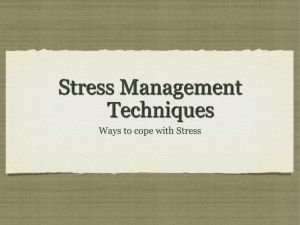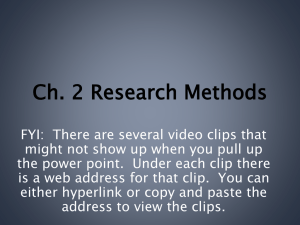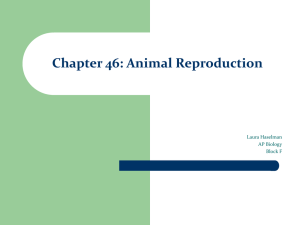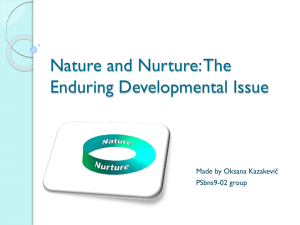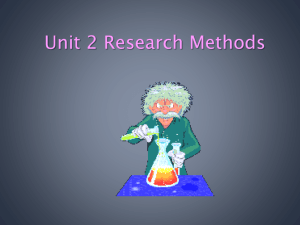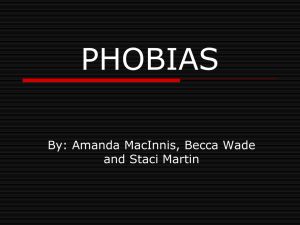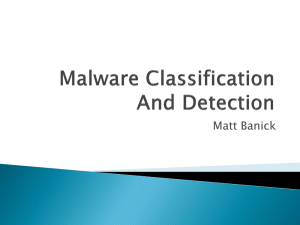Ch. 2 Research Methods
advertisement
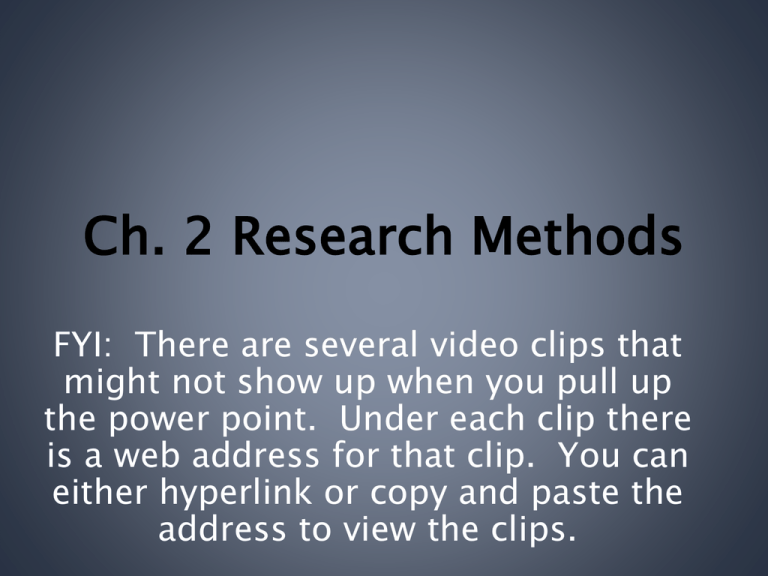
Ch. 2 Research Methods FYI: There are several video clips that might not show up when you pull up the power point. Under each clip there is a web address for that clip. You can either hyperlink or copy and paste the address to view the clips. • Experiments http://www.youtube.com/watch?v=KPgpRw9tiuM Terms used in Research: • Hypothesis: we are moving from an educated guess to expresses a relationship between two variables. http://www.google.com/imgres?imgurl=http://www.simplypsychology.pwp.blueyonder.co.uk/hypothesis.jpg&imgrefurl=http://www.simp lypsychology.pwp.blueyonder.co.uk/aimshypotheses.html&usg=__NRh_zDntHhH4hvdURWKWFOXauEI=&h=384&w=428&sz=19&hl=en&start=0&zoom=1&tbnid=toLUNv3BSvDUhM:&tbnh=123&tbnw=137&prev=/images%3Fq%3Dhypothesis%26um%3D1%26hl%3Den%26sa%3DN%26rlz%3D1T4ADRA_enUS376US377%26biw%3D1899%26bih%3D922%26 tbs%3Disch:1&um=1&itbs=1&iact=rc&dur=193&ei=qCyETKj7FZCgsQPilPytCw&oei=qCyETKj7FZCgsQPilPytCw&esq=1&page=1&ndsp=38&ved=1t:429,r:1,s:0&tx=54&ty=87 Theory A theory is a based upon a hypothesis and backed by evidence. A theory presents a concept or idea that is testable. In science, a theory is not merely a guess. A theory is a fact-based framework for describing a phenomenon. Fun Theory: http://www.youtube.com/watch?v=2lXh2n0aPyw http://www.youtube.com/watch?v=zSiHjMU-MUo • A theory Aims to explain Variables are what you are manipulating in your experiment. http://www.youtube.com/watch?v=Hxbz656Euyw http://tytusblog.blogspot.com/2009/08/engineers-make-better-models-of.html Independent variable • The independent variable is the characteristic of a psychology experiment that is manipulated or changed. For example, in an experiment looking at the effects of studying on test scores, studying would be the independent variable. Dependent Variable • The dependent variable is the variable that is being measured in an experiment. For example, in a study on the effects of tutoring on test scores, the dependent variable would be the participants test scores. Let’s try some: • Students watched a cartoon either alone or with others and then rated how funny they found the cartoon to be. • • Independent Variable: • • • Dependent Variable: Smithers thinks that a special juice will increase the productivity of workers. He creates two groups of 50 workers each and assigns each group the same task (in this case, they're supposed to staple a set of papers). Group A is given the special juice to drink while they work. Group B is not given the special juice. After an hour, Smithers counts how many stacks of papers each group has made. Group A made 1,587 stacks, Group B made 2,113 stacks. Identify the: 1. Control Group 2. Independent (Manipulated) Variable 3. Dependent (Responding) Variable 4. What should Smithers' conclusion be? 5. How could this experiment be improved? Homer notices that his shower is covered in a strange green slime. His friend Barney tells him that coconut juice will get rid of the green slime. Homer decides to check this this out by spraying half of the shower with coconut juice. He sprays the other half of the shower with water. After 3 days of "treatment" there is no change in the appearance of the green slime on either side of the shower. 6. What was the initial observation? Identify the7. Control Group 8. Independent (Manipulated) Variable 9. Dependent (Responding) Variable 10. What should Homer's conclusion be? Bart believes that mice exposed to radiowaves will become extra strong (maybe he's been reading too much Radioactive Man). He decides to perform this experiment by placing 10 mice near a radio for 5 hours. He compared these 10 mice to another 10 mice that had not been exposed. His test consisted of a heavy block of wood that blocked the mouse food. he found that 8 out of 10 of the radiowaved mice were able to push the block away. 7 out of 10 of the other mice were able to do the same. Identify the11. Control Group 12. Independent (Manipulated) Variable 13. Dependent (Responding) Variable 14. What should Bart's conclusion be? 15. How could Bart's experiment be improved? Krusty was told that a certain itching powder was the newest best thing on the market, it even claims to cause 50% longer lasting itches. Interested in this product, he buys the itching powder and compares it to his usual product. One test subject (A) is sprinkled with the original itching powder, and another test subject (B) was sprinkled with the Experimental itching powder. Subject A reported having itches for 30 minutes. Subject B reported to have itches for 45 minutes Identify the16. Control Group 17. Independent (Manipulated) Variable 18. Dependent (Responding) Variable 19. Explain whether the data supports the advertisements claims about its product. Validity and Reliability • Valid: it is accurate • Reliable: It can be replicated Validity • Validity is the extent to which a test measures what it claims to measure. It is vital for a test to be valid in order for the results to be accurately applied and interpreted. • Validity isn’t determined by a single statistic, but by a body of research that demonstrates the relationship between the test and the behavior it is intended to measure. Reliability • Reliability refers to the consistency of a measure. A test is considered reliable if we get the same result repeatedly. For example, if a test is designed to measure a trait (such as introversion), then each time the test is administered to a subject, the results should be approximately the same. • Placebo: A placebo is a substance with no known medical effects. SHHHHHHH This lady thinks she has been given and antidepressant but really she only got a placebo. Problems with Research Overconfidence • We tend to think we know more than we do. 82% of U.S. drivers consider themselves to be in the top 30% of their group in terms of safety 81% of new business owners felt they had an excellent chance of their businesses succeeding. When asked about the success of their peers, the answer was only 39%. (Now that's overconfidence!!!) Confirmation Bias • A tendency for people to accept information that confirms what they want believe Psych335 - Confirmation Bias - Team 16 http://www.youtube.com/watch?v=fc0tiNGi8jw&feature=related Hindsight Bias The tendency to believe after the outcome that you knew it all along. • http://www.google.com/imgres?imgurl=http://www.nixlab.net/blog/IMG/Hindsight.jpg&imgrefurl=http://www.nixlab.net/blog/&usg=__ f8Bb5dXyhMSq_cgPTXQXgLeZGYM=&h=366&w=500&sz=24&hl=en&start=256&zoom=1&tbnid=H0aVbz2SW4ftPM:&tbnh=113&tbnw=149&prev=/images%3 Fq%3Dhindsight%26um%3D1%26hl%3Den%26rlz%3D1T4ADRA_enUS376US377%26biw%3D1899%26bih%3D922%26tbs%3Disch:1&um=1&itbs=1&iact=rc&dur=371&oei=Gg-FTIWGEoTAsAOiuMn2Bw&esq=undefined&page=8&ndsp=36&ved=1t:429,r:2,s:256&tx=85&ty=51 http://www.youtube.com/watch?v=DIzAaY2Jm-s Scene: 3min. Hawthorne Effect • Just knowing you are participating in a study can change the outcome. Pg. 43 Hawthorne effect http://www.youtube.com/watch?v=IxZoxN5IjFE http://www.propagandaposters.us/poster11.html Experimenter Bias Experimental bias is where the scientist or researcher doing the research influences the results so that they can show a certain outcome. • “Did you study for your test?” • “MMMM.. I think he wants me to say yes?!?” Experimental vs. Control Group Pg. 40 • Experimental Group: Receives Treatment • Control Group: receives no treatment Let’s try one • Larry was told that a certain muscle cream was the newest best thing on the market and claims to double a person’s muscle power when used as part of a muscle-building workout. Interested in this product, he buys the special muscle cream and recruits Patrick and SpongeBob to help him with an experiment. Larry develops a special marshmallow weight-lifting program for Patrick and SpongeBob. He meets with them once every day for a period of 2 weeks and keeps track of their results. Before each session Patrick’s arms and back are lathered in the muscle cream, while Sponge Bob’s arms and back are lathered with the regular lotion. • Which person is in the control group? • What is the independent variable? • What is the dependent variable? A study was created to test the effects of jazz on people’s sleep patterns. The hypothesis of the experiment was that if people listened to jazz music as they fall asleep, they will sleep for longer periods of time. For the experiment, 2 groups of people were created. One group was placed in a quiet room where they went to sleep and they were timed on how long they slept. The other group was placed in a room where jazz music played softly as they began to sleep and played throughout the night. As each group awoke, their sleep times were monitored. Control Group: Experimental group: Independent Variable: Dependent variable: Double Blind vs. Single Blind A double-blind study is one in which neither the participants or the experimenters know who is receiving a particular treatment. http://www.youtube.com/watch ?v=D40FnLs1g-k A single-blind study is one in which experimenters know who is receiving a particular treatment but the patient does not. Self-Fulfilling Prophesy belief that becomes true because people act as though it is true. Methods of Research Types of Research • Descriptive • Correlational • Experimental Experimental Method pg. 39 http://www.youtube.com/watch?v=6EjJsPylEOY • Done in a lab. • Good: You have control over your environment. http://www.youtube.com/watch?v=QX_oy9614HQ Naturalistic Observation • involves observing subjects in their natural environment. Jane Goodall http://www.youtube.com/watch?v=k5Q6-hh49mU Pg. 37 Good: Let’s you observe in a participants natural setting. Naturalist Observation BAD: you have to avoid disturbing what you are studying Case Studies An intense study of a person or group. Diaries, Tests, and interviews. http://www.youtube.com/watch?v=fD1WqPGn5Ag Survey Says… it is a data collection tool used to gather information about individuals. http://www.youtube.com/watch?v=iejf3YZboQ8 • We like Survey’s because: – 1. They are cheap – 2. you can get a large amount of information quickly. We don’t like Survey’s because: 1. Danger of participants putting the wrong answers. Sampling • SAMPLE is a group of participants that represent a POPULATION six-sigma-material.com http://mips.stanford.edu/courses/stats_data_analsys/lesson_1/234_0_a.html A BAD SAMPLE Finding the average height of men or women by using basketball players for your sample. Longitudinal Studies http://www.google.com/imgres?imgurl=http://www.cfr.nichd.nih.gov/images/children_linedup2.jpg&imgrefurl=http://www.cfr.nichd. nih.gov/longitudinal.html&usg=__w_lHT2 -TFLy8l_gLnyOF-8W7ctE=&h=364&w=589&sz=68&hl=en&start=0&zoom=1&tbnid=J01pJhEZ4AmeM:&tbnh=99&tbnw=160&prev=/images%3Fq%3Dlongitudinal%2Bstudies%26um%3D1%26hl%3Den%26sa%3DN%26rlz%3D1T4ADRA_enUS376US377%26biw%3D1899%26bih%3D92 2%26tbs%3Disch:1&um=1&itbs=1&iact=rc&dur=334&ei=OheETPijDIn4swPDutH2Bw&oei=OheETPijDIn4swPDutH2Bw&esq=1&page=1&ndsp=37&ved=1t:429,r:10,s:0&tx=61&ty= 59 Data is taken from a group over a period of time. Cross-Sectional Studies • Data is collected from groups of individuals of different ages and compared. http://www.google.com/imgres?imgurl=http://goodhealth.freeservers.com/Indonesia_kids_smoking.jpg&imgrefurl=http://snusnews.blogspot.com/2009_06_07_archive.html&usg=__oeZOXLzTwb1zO0kgdosS5qe_rCU=&h=351&w=468&sz=29&hl=en&start=132&zoom=1&t bnid=229vf0XnoqVSUM:&tbnh=116&tbnw=152&prev=/images%3Fq%3Dkids%2Bsmoking%26um%3D1%26hl%3Den%26sa%3DN%26rlz%3D1T4ADR A_enUS376US377%26biw%3D1899%26bih%3D922%26tbs%3Disch:10%2C1185&um=1&itbs=1&iact=hc&vpx=1059&vpy=534&dur=2485&hovh=19 4&hovw=259&tx=140&ty=90&oei=wjGETOCOAYjksQOO1pj3Bw&esq=undefined&page=5&ndsp=36&ved=1t:429,r:7,s:132&biw=1899&bih=922 http://www.google.com/imgres?imgurl=http://www.babble.com/CS/blogs/strollerderby/image141306x.jpg&imgrefurl=http://www.babble.c om/CS/blogs/strollerderby/archive/tags/teen%2Bsmoking/default.aspx&usg=__NXRN3isiMRxtCylaCFg0QXJdIU=&h=278&w=370&sz=21&hl=en&start=0&zoom=1&tbnid=B1brJTNGGuPE1M:&tbnh=114&tbnw=156&prev=/images%3Fq%3Dte ens%2Bsmoking%26um%3D1%26hl%3Den%26sa%3DN%26rlz%3D1T4ADRA_enUS376US377%26biw%3D1899%26bih%3D922%26tbs%3Disch:1&u m=1&itbs=1&iact=hc&vpx=280&vpy=102&dur=349&hovh=195&hovw=259&tx=248&ty=96&ei=NTKETLKbOISesQPTo_z2Bw&oei=NTKETLKb OISesQPTo_z2Bw&esq=1&page=1&ndsp=37&ved=1t:429,r:1,s:0 http://www.google.com/imgres?imgurl=http://www.lindsayheller.com/wp-content/uploads/2010/01/cigar_smoking_oldladies_0.jpg&imgrefurl=http://www.lindsayheller.com/%3Fpaged%3D11&usg=__FkMm0dRST9c9tJNK7B_LT22sqOE=&h=580&w=704&sz=70&hl=en&s tart=0&zoom=1&tbnid=JbiB_M2_DPBkCM:&tbnh=110&tbnw=133&prev=/images%3Fq%3Dold%2Bpeople%2Bsmoking%26um%3D1%26hl%3Den%26sa% 3DN%26rlz%3D1T4ADRA_enUS376US377%26biw%3D1899%26bih%3D922%26tbs%3Disch:1&um=1&itbs=1&iact=rc&dur=324&ei=wzKETN_CJI6isQOv3 oD3Bw&oei=wzKETN_CJI6isQOv3oD3Bw&esq=1&page=1&ndsp=40&ved=1t:429,r:12,s:0&tx=124&ty=46 Click me: http://www.youtube.com/watch?v=zVDFnUAXa3w Correlation pg. 39 The measure of a relationship between two variables = This would be a positive correlation Correlation does not mean Causation. • Detects relationships between variables. • Does NOT say that one variable causes another. There is a positive correlation between ice cream and murder rates. Does that mean that ice cream causes murder? Why do we have Ethical Guidelines? During WWII the Nazi’s conducted some very unethical studies. Many of their subjects died during theses experiments. What you need to know is: 1. These people were denied the principles in the Belmont Report including being asked to participate. Willowbrook • Due to overcrowding, children were denied entrance to the Willow brook State Mental Hospital unless parents enrolled their children into the less-crowded hepatitis ward. Geraldo Rivera did a story on the horrible conditions there. The children were not clothed and forced to eat in three minutes. It was horrible. Tuskegee Syphilis Study: In 1932, the Public Health Service enrolled several hundred syphilitic black males to document the effects of the untreated disease over time. Tuskegee was chosen because approximately 40% of the male population of the town was infected with the disease. Treatment was withheld from study subjects when penicillin was accepted as the treatment for syphilis in 1943. This study was stopped in 1973 but not before many subjects became seriously ill, transmitted their disease to others or died. This study exemplifies unfair subject selection practices (syphilis can potentially affect all human beings and is not limited to African American males), denial of informed consent and excessive risk in relation to study benefits. • Milgram Study (1963): The Milgram study involved instructing subjects to administer electric shocks to a study confederate in response to poor performance. The subject believed that he/she was involved in a study about learning and memory with each shock intended to affect the learning process. The confederate pretended to be hurt by the shock - in some cases, to the point of losing consciousness; however, he/she did not really feel any shock. The study objective was to assess obedience to authority. This study resulted in significant psychological stress for some subjects including sweating, trembling, stuttering and serious seizures in three subjects. However, in a postexperimental interview, about half of the subjects expressed that they were glad to have participated in the experiment. The question of whether this study was ethical remains open to debate among scholars today. The Monster Study • A Speech Experiment where Wendell Johnson rounded up some orphans and separated them into two groups. The first group received positive reinforcement all of the time. The second group was constantly critiqued. He wanted to see if they would start stuttering. http://www.highestfive.com/mind/5-unethical-psychexperiments/ • Stanford Experiment • A group of men volunteered for a study and were given the roles of prisoners or guards. In a short time the guards took it upon themselves to start trouble with the prisoners and the experiment got out of hand. Lesson in “the Lucifer” Effect. How good guys turn bad. Stanford: The Lucifer Effect • When Good People Do Bad Things, Part 2 http://www.youtube.com/watch?v=H47hhWxlP5A Ethical Issues in Research • Respecting the rights of human research participants involves: – Informed consent is an explanation of a study and the responsibilities of experimenter and participant – Deception involving the subjects must be justified – Confidentiality of study information must be maintained – Debriefing refers to explaining the research process to the subjects at the end of the study • Animal research must be justified and must minimize discomfort to participants © 2004 John Wiley & Sons, Inc. Huffman: PSYCHOLOGY IN ACTION, 7E • Who has to approve ALL research??? • IRB • Institutional Review Board (IRB) Statistics • A branch of math that summarizes and makes meaningful inferences from the data. http://www.google.com/imgres?imgurl=http://pix.motivatedphotos.com/2009/8/26/633868570471027490STATISTICS.jpg&imgrefurl=http://www.motivatedphotos.com/%3Fid%3D34720&usg=__v2u198pP5mA5uxBs2v5cCmV4Szo=&h=600&w=800&sz=70&hl=en&start=70&zoom=1& tbnid=b5h6z3gr0US9OM:&tbnh=123&tbnw=163&prev=/images%3Fq%3Dstatistics%2Bfunny%26um%3D1%26hl%3Den%26sa%3DN%26rlz%3D1T4ADRA_enUS376US377%26biw%3D 1899%26bih%3D922%26tbs%3Disch:10%2C663&um=1&itbs=1&iact=hc&vpx=1286&vpy=376&dur=2777&hovh=194&hovw=259&tx=140&ty=91&oei=QPuETPNJhNa1A7qDrPYH &esq=3&page=3&ndsp=34&ved=1t:429,r:19,s:70&biw=1899&bih=922 Normal Distribution Mode Statistics the most frequently occurring score in a distribution Mean the arithmetic average of a distribution obtained by adding the scores and then dividing by the number of scores Median the middle score in a distribution half the scores are above it and half are below it Range Highest score from lowest score. Let’s try one • • • • • 84 1. 2. 3. 4. , 66 ,102 , 114 , 78 , 90 Range: Mean: Mode: Median:
